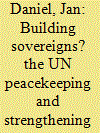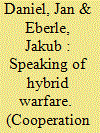| Srl | Item |
| 1 |
ID:
156246


|
|
|
|
|
| Summary/Abstract |
This paper contributes to the debate on the recent ‘stabilization turn’ in United Nations (UN) peacekeeping by inquiring into a changing set of practices by which the UN intends to ‘strengthen the authority of the state.’ Drawing on Piiparinen’s notion of sovereignty-building as an emerging paradigm of conflict management, the study analyses the support for state authority and sovereignty in two modalities of contemporary UN peace operations – UNIFIL II and MINUSMA. While the two analysed missions significantly differ when it comes to the extent of their tasks, or the rules for the use of force, they both highlight the importance of local politics and agency in the implementations of their mandates and the need to strike a compromise between the contending visions on what form of sovereignty should be supported. By doing so, the paper points out the importance of ‘local’ and contextual emergence of the practices of sovereignty-building.
|
|
|
|
|
|
|
|
|
|
|
|
|
|
|
|
| 2 |
ID:
182617


|
|
|
|
|
| Summary/Abstract |
What do we speak of when we speak of ‘hybrid warfare’, a notion that has become prominent in discussions of European security? The article shows that this question is difficult to answer, as the hybrid warfare discourse is not only vague, but also consists of multiple, and at times contradictory, narratives. While talking and writing about supposedly the same thing, participants in the hybrid warfare debate often suggest markedly different ideas about the precise nature and target of the threat, offer different responses and draw upon different expertise. Grounding our argument in critical scholarship on narratives, security knowledge and hybrid warfare, we build a framework for studying security narratives around the four elements of threat, threatened value, response and underlying knowledge. This framework is utilised in a case study of Czechia, a country that has played a pioneering and outsized role in European hybrid warfare debates. We identify three narratives of hybrid warfare – defence, counterinfluence and education – which present markedly different understandings of ‘hybrid warfare’, and ways to defend against it. Our intervention hopes to contribute to disentangling the contradictions of the hybrid warfare discourse, itself a necessary precondition for both sound state policy and an informed public debate.
|
|
|
|
|
|
|
|
|
|
|
|
|
|
|
|